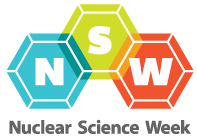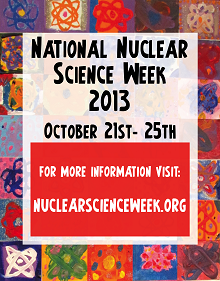A message from Electrical Builders, Ind.
America’s Top Performing Nuclear Plants Rely on Electrical Builders, Industries to Expand and Extend the Life of Their Critical Electrical Assets

A message from Electrical Builders, Ind.
America’s Top Performing Nuclear Plants Rely on Electrical Builders, Industries to Expand and Extend the Life of Their Critical Electrical Assets
On Episode 12 of RadioNuclear, we discuss how fear-mongering stories about nuclear power plants in the path of a hurricane are irrelevant, the Oyster Creek Shutdown, and lastly, how nuclear power should be used geopolitically.

October brings many wonderful things each year, but of special interest to us is the annual National Nuclear Science Week (#NuclearSciWeek on social media) event which is intended to help everyone learn how nuclear science and technology works every day to improve their lives.
 Wednesday during National Nuclear Science Week is devoted to the topic of Nuclear Energy. Do you know how we use the energy obtained by splitting the atom to produce the electricity that charges up your phone, powers your TV and router, and lights your way? Click on the link below to see the basics.
Wednesday during National Nuclear Science Week is devoted to the topic of Nuclear Energy. Do you know how we use the energy obtained by splitting the atom to produce the electricity that charges up your phone, powers your TV and router, and lights your way? Click on the link below to see the basics.
The process for renewing research and test reactor (RTR) licenses in the United States has been subject to lengthy delays and periodic backlogs since the early 1980s. Despite the apparent time invested in improvement efforts, the process does not seem to be getting better very fast. The difficulty, schedule uncertainty, and cost of renewing research reactor licenses adds to the burden of owning and operating research reactors. The scale of the challenge may contribute to regrettable institutional decisions that maintaining operable facilities is not worth the trouble.
The American Nuclear Society's Center for Nuclear Science and Technology Information will sponsor a full-day teacher workshop on Saturday, June 14, at the Grand Sierra Resort in Reno, Nevada. The workshop-Detecting Radiation in Our Radioactive World-is for science educators, including biology, chemistry, earth science, physics, physical science, life science, environmental, general science, and elementary teachers. The workshop will be held the day before the beginning of the ANS Annual Meeting in Reno.
Earlier this month, the Oak Ridge Institute for Science and Education (ORISE) published its annual survey on nuclear engineering enrollment and degrees (check out the full report here). The 2013 data shows enrollment and the number of graduates in nuclear engineering programs along with a survey of where students are working after graduation.
Fans of the popular games Portal and Portal II will get a kick out of this one-or just fans of evil and corrupt artificial intelligences-or just fans of nuclear fission, fusion, and astronomy.
On Saturday, January 25, 2014, members of the American Nuclear Society's Chicago Section organized and participated in "Atomic Fission Fun," an event for Girl Scouts to learn about nuclear science. Sixty middle school students from the Girl Scouts of Greater Chicago and Northwest Indiana traveled to the Illinois Institute of Technology campus in Wheaton, Ill., to participate.
 In case you haven't already seen all of the tweets, facebook posts and posters, I am thrilled to let you know that next week is National Nuclear Science Week for 2013! For the past two years I've been very lucky to participate as a Steering Committee member for this educational and very fun event, which continues to grow exponentially each year thanks to our fantastic team of nuclear educators.
In case you haven't already seen all of the tweets, facebook posts and posters, I am thrilled to let you know that next week is National Nuclear Science Week for 2013! For the past two years I've been very lucky to participate as a Steering Committee member for this educational and very fun event, which continues to grow exponentially each year thanks to our fantastic team of nuclear educators.
From July 7 -12, 16 students from around the country came to Washington DC to talk with politicians and policymakers about nuclear engineering education funding, energy policy, and other nuclear issues as part of the 2013 Nuclear Engineering Student Delegation (NESD). This year the delegation was comprised of students with especially diverse backgrounds, including nuclear engineering, chemical engineering, materials science, and nuclear safeguards policy. The chair of the delegation was Matthew Gidden, a Ph.D. candidate at the University of Wisconsin-Madison studying nuclear engineering and energy policy. He was assisted by two co-vice chairs: Mark Reed of the Massachusetts Institute of Technology and Nicholas Thompson of Rensselaer Polytechnic Institute.
Get to Know Nuclear
The Opening Plenary at the 2013 ANS Annual Meeting is now underway-and it's amazing how much goes on before the "Opening". Already on Saturday morning a Teachers Workshop was in progress, and Saturday evening the Global Leadership Reception was in full swing. A few select photos:
The 2013 Conference on Nuclear Training and Education took place on February 3-6 in Jacksonville, Florida. More than 300 participants and 26 exhibitors contributed to make this conference a success. Trainers and educators from industry and higher education covered a range of topics, from operator fundamentals to leadership strategies in the nuclear industry.
Sunday, June 16, 2013
Get to Know Nuclear
A group of IBM researchers have created the world's smallest movie - starring 130 atoms (well, the oxygen atoms of carbon monoxide molecules). An atomic-scale must-see!
The American Nuclear Society's Center for Nuclear Science and Technology Information and the ANS Outreach Department will sponsor a full-day teacher workshop on Saturday, June 15, in Atlanta, Georgia. The workshop-Detecting Radiation in Our Radioactive World-is for science educators, including elementary, biology, chemistry, earth science, physics, physical science, life science, environmental, and general science teachers. The workshop will be held the day before the beginning of the ANS Annual Meeting in Atlanta.
With Unit 6 returning from a planned maintenance outage earlier this week, all 8 reactors at the world's largest nuclear electrical generating station are now online, generating emission-free electricity from the Bruce Nuclear Generating Station in Ontario, Canada ("Full Power at the Bruce").
The nuclear energy industry is the only large-scale energy producer responsible for managing and storing (and paying for) all the wastes generated by the process [in contrast to, for example... dumping wastes into the atmosphere].